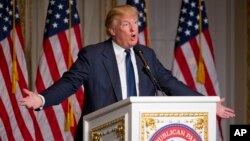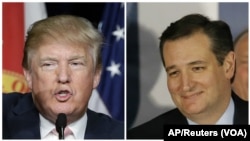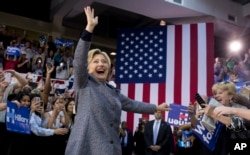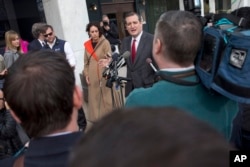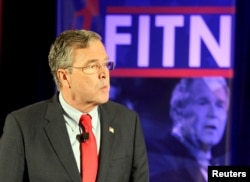The leading U.S. presidential candidates are trading new ideas and sharp barbs over how best to cope with the threat of terrorism in the immediate aftermath of the deadly Brussels terrorist attacks.
The Republican front-runner, billionaire real estate mogul Donald Trump, suggested that Tuesday's attack in the Belgian capital that killed at least 31 people and injured another 271 could have been prevented if authorities had resorted to harsh interrogation techniques, including torture, against Paris attacker Salah Abdeslam, who was captured in Belgium last week.
Abdeslam has reportedly been talking to investigators, but Trump told CNN, "Well, you know he may be talking, but he'll talk a lot faster with the torture."
Cruz calls for freeze on some refugees' admission
Trump's chief rival for the Republican nomination, Texas Senator Ted Cruz, a conservative firebrand in the halls of Congress, called for a freeze on admission to the U.S. of any new refugees from countries with "significant" contingents of al-Qaida and Islamic State jihadists. He said U.S. law enforcement authorities need to be given the authority "to patrol and secure Muslim neighborhoods before they become radicalized."
Cruz branded Trump as "hopelessly naive" for suggesting this week that the United States reduce its support for NATO, the West's military alliance since the end of World War II.
Trump, who has called for a temporary ban on Muslims entering the U.S., said he thought Cruz's idea to patrol Muslim neighborhoods was "a good idea."
Clinton attacks Trump
The leading Democratic presidential contender, former secretary of state Hillary Clinton, denounced Trump, saying, "This is about not only selecting a president, but also selecting a commander-in-chief. The last thing we need is leaders who incite more fear."
Clinton, the wife of former president Bill Clinton, added, "We don't build walls or turn our back on our allies. We can't throw out everything we know about what works and what doesn't and start torturing people."
Trump in turn rebuked her, telling one interviewer, "Incompetent Hillary doesn't know what she's talking about. She doesn't have a clue."
The charged atmosphere about possible terrorist threats in the United States came as voters cast ballots Tuesday in three more presidential nominating contests, in the western states of Arizona, Utah and Idaho.
Tuesday's results
Trump routed Cruz in Arizona, along the U.S.-Mexican border, winning all 58 of the state's delegates to the Republican national nominating convention in July.
Cruz easily won in heavily Mormon Utah, collecting all 40 of the state's national convention delegates. The day's results left Trump far ahead in the race to win enough pledged convention delegates ahead of the quadrennial gathering, but still 40 percent away from the majority of delegates he needs to claim the nomination.
Cruz on Wednesday picked up the endorsement of former Florida governor Jeb Bush, who dropped out of the race last month. In a statement released by the Cruz campaign, Bush called Cruz the only hope for Republicans to win back the White House and criticized Trump.
"For the sake of our party and country, we must move to overcome the divisiveness and vulgarity Donald Trump has brought into the political arena," Bush said.
The next Republican voting is set for April 5, with a party primary in the Midwestern state of Wisconsin.
A third contender in the Republican contest, Ohio Governor John Kasich, was not a factor in either Arizona or Utah.
Kasich's last hope
Kasich cannot mathematically win the nomination before the national convention and is banking his hopes on winning it then if neither Trump nor Cruz has claimed it ahead of time.
A new Quinnipiac University poll Wednesday showed that Kasich is the only Republican, and not Trump or Cruz, who would defeat Clinton in a hypothetical match in the November national election. The winner of the U.S. election will replace President Barack Obama, who leaves office in January 2017.
Clinton easily won Tuesday's Democratic primary in Arizona against her sole rival, Vermont Senator Bernie Sanders, but he captured two party caucuses against her, in Utah and Idaho.
Sanders, who has centered his campaign on the growing income equality in the United States and the power of Wall Street financial titans, won a handful more convention delegates than Clinton in the three contests, but remains far behind her in the overall race to win the Democratic nomination.




